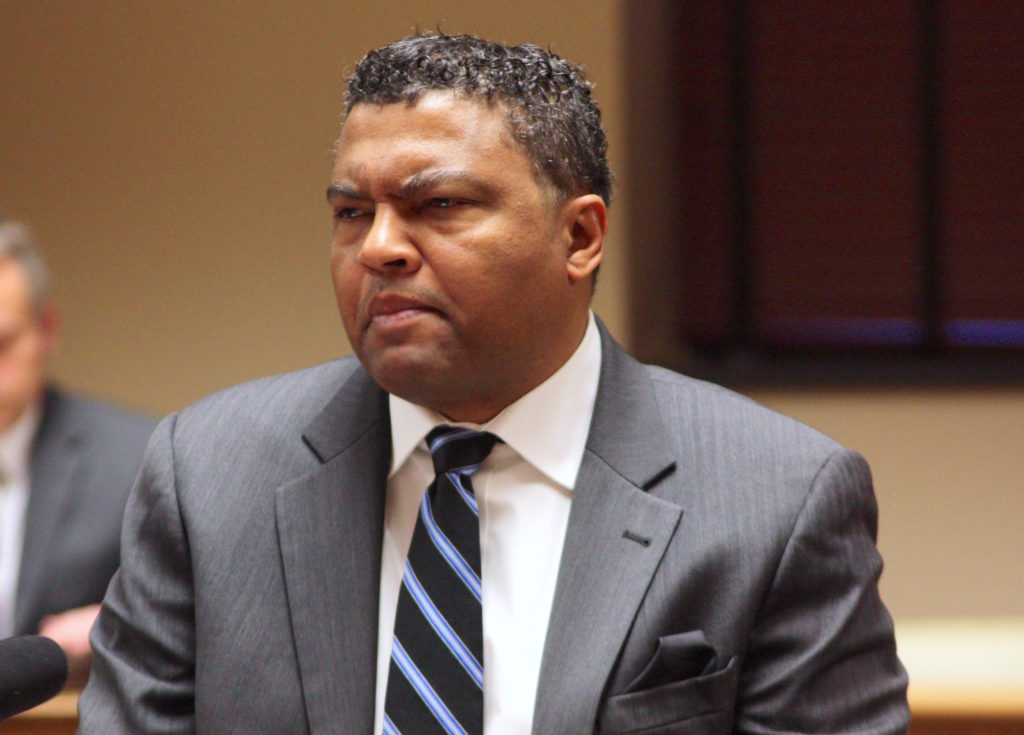
The director of Nashville’s new police oversight department says his decision to step down earlier this week wasn’t just due to stress.
Shortly after announcing his resignation, William Weeden told WPLN he felt like the Community Oversight Board hadn’t granted him enough autonomy. His departure comes after a tense dispute with board members at a public meeting last month.
The Letter
At the Community Oversight Board’s October 23 monthly meeting, Chair Ashlee Davis scrolled along the screen of her cell phone, her bespectacled eyes cast down. She was reading a letter to Executive Director William Weeden.
“This letter is a written warning for unsatisfactory job performance,” Davis uttered, stumbling a bit over her words. “The Community Oversight Board — COB — recognizes the importance of its mission and also acknowledges that having a Metro Nashville Community Oversight staff led by a strong executive director is integral to meeting the stated purpose and objectives of the COB.”
Tensions had been brewing for weeks.
Davis said board members had repeatedly asked the director for better communication. She rattled off a list of complaints: failing to inform the board about invitations to speak with elected officials, missing deadlines to submit progress reports, sending memos and meeting minutes filled with errors and typos.
The board, Davis said, was issuing a warning.
“I really look at this as us having a belief that the person we hired can do better and will,” she said.
Weeden asked for more guidance.
“Not knowing what trigger points are most important to you as a board, there’s no way I can anticipate what issues of major concern may come up,” he said. “Written guidance would be appreciated — outlines, strategic plans. The same as I’ve been giving instruction to the staff, I need that same instruction from you.”
But in an interview with WPLN earlier this week, Weeden said such a public airing of criticism only made his job more difficult. In that moment, Weeden said, he felt deflated.
“I think it kind of took away from my enthusiasm for what I was doing at that point, because of the nature of the effects of that public scrutiny,” he said.
Weeden said he didn’t decide to leave his position solely due to stress. That, he said, was expected.
And it wasn’t about the pushback he faced from Metro Police, either. Weeden’s spent much of his career navigating tense relationships with law enforcement.
“I didn’t come in and expect that, you know, it was going to be open arms with the police department or FOP. I didn’t expect that all,” he said. “And, true to form, it wasn’t.”
But Weeden said he thought he’d have more independence — and support from the board to negotiate with police from a position of strength.
“Things that occurred during that meeting was detrimental to what I needed to accomplish in the position,” he said. “And it made it just that much more difficult.”
Conflicting narratives
Weeden wishes that letter had never been read at a public meeting. He said Davis, who serves as the main point of contact between the volunteer board and Metro department staff, had already expressed her concerns in a one-on-one meeting.
But as chair of a group committed to transparency, Davis said she felt she had no other choice. Setting a formal performance improvement plan with Metro’s human resources department required approval from board members, she said.
“I could not have made a unilateral decision without taking a vote from the board, which would naturally require a public meeting,” she said in an interview. “So that’s why I simply could not do such a thing at a coffee shop, for instance, or somewhere in a private setting.”
Davis said she wanted to put the board’s expectations for the director in clear writing, on the record. But she said she was surprised to hear Weeden felt like his autonomy had been undermined.
“The board, without a doubt, we were eager to see the executive director, Mr. Weeden, in place,” she said. “And, in fact, we were engaged in so many other things that were outside of his purview that really didn’t give us the time to micromanage.”
Davis was surprised by Weeden’s decision to step down. Now, she’s gearing up to the lead the search for his replacement, which will likely be arduous. Weeden was selected from a competitive, nationwide pool, and was one of of five finalists. But, Davis said, changes in leadership won’t hinder the group’s progress.
Weeden agreed. It’ll take time to build trust between law enforcement and citizens, he said. But he hopes the next director will continue down the path he laid in his seven months on the job.
“Community oversight will survive in Nashville. I think the community support is tremendous,” Weeden said. “As long as that community support remains, and that enthusiasm for community oversight remains, and that political will and community will remains strong, community oversight will survive in Nashville and thrive in Nashville.”
Samantha Max is a Report for America corps member.

